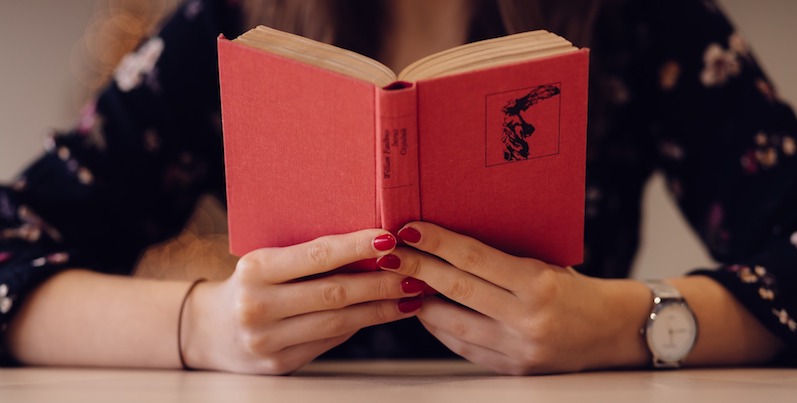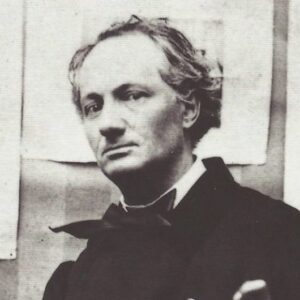Emily McCrary-Ruiz-Esparza on the Unique Pleasures of Reading in Public
“I always carry a book with me. That way you’re never without something to do.”
Carry a book around long enough, and strangers will approach you.
It’s not the experienced reader who approaches. Habitual, even obsessive public readers, aren’t generally talkers; hence the book at a restaurant, on the bus, standing in line for the self-checkout, waiting to be vetted for jury service, while getting the oil changed, in the exam room with feet in the stirrups, at the park, or queuing up to see a taping of Jeopardy! If we were in the business of striking up conversation with the people next to us, we wouldn’t make ourselves so unavailable.
To the non-reader, lone readers in public are a curiosity. Given my propensity to travel alone, I have sat by myself at many a restaurant, wedding ring on hand, with a general look of sexual unavailability, and both men and women have approached to ask me what on earth I’m doing, and do I need help.
Most non-readers are curious, some concerned, others downright mystified. The experienced reader humors this tourist (we’re a polite society), who doesn’t realize that the public reader is not a social invalid waiting to be cured. The public reader is confident and not interested in pity. For we are not pitiful.
Personally, I welcome interruption when the stranger approaches with the unmistakable excitement of the newly initiated. The man at 10-Minute Oil Change checks the room for eavesdroppers, then says, I’ve gotten back into reading myself. I hated the books we had to read in school. I haven’t read in thirty years, but my girlfriend gave me that Trevor Noah biography, and it’s great.
Novice readers are eager to talk. The newcomer approaches the public reader with barely tamped excitement. I’ve started reading again, they whisper, as if confessing that they’ve taken a lover. Isn’t it great?
For the new reader, seeing other readers in public produces the same sensation as learning a new word and then encountering it repeatedly. (This too they will experience on the regular now that they’ve been initiated into the fold of readers.) A non-reader picks up the right book, realizes how wonderful it is to read, then looks up to see that there are readers everywhere. To the new reader, the public reader represents a new and now possible identity. And a new ritual: reading as time-passing. Not: reading as a chore.
Recommending books is a skill well sharpened by the public reader. A book recommendation is an endorsement of that book to the world.At a restaurant recently, the hostess, as she led me to my one-top table, remarked on my spanking new hardback of Grand Hotel Europa.
“Is it a good book?” she said.
“So far, though I’ve only cracked it this morning. I’ll have to let you know.”
The hostess laid down the menu, then leaned in. “I’ve just gotten back into reading,” she said. “You know how you go through phases and get into reading and then not again?”
“No,” I said.
“Well, a friend of mine lent me her copy of The Paris Apartment, and I’m loving it. I think I’ll read another one right after it. Maybe you could recommend something?”
To the public reader, this question is as romantic as a marriage proposal. We don’t take it lightly. I asked her what she likes (artists, historical fiction, romance) and told her I would think about it. On my way out the door, I handed the hostess a folded cocktail napkin. “Try Life with Picasso by Françoise Gilot. She was one of his long-term partners, an artist herself, and she’s still alive.” As for Grand Hotel Europa: must love monologues.
Recommending books is a skill well sharpened by the public reader. A book recommendation is an endorsement of that book to the world. We know that, given to the right person, the message will be spread like the gospel in the hands of a Methodist.
A thoughtful recommendation that strikes at the right place at the right moment can quicken the soft spots in the mind and heart that have long been congealed. That is how new readers are converted.
So how does a new reader become a public reader? It doesn’t happen right away. Unsure how it will be taken and whether they’re reading the right thing, the new reader has not yet built the confidence to take their habit in public. They must also endure the slow and painful separation from their phone, which seems to light the face of every human paused for more than a moment.
They try a coffee shop, then, on their next trip, the airport. What about stepping out further? The park? Do I just sit there on the bench and read? The thought is exhilarating.
At the dentist last month, I waited in the space-age barcalounger, reading my paperback copy of Sylvia Plath short stories to distract myself from the inevitability of needles in my gums and steel scraping my molars, careful to skip “Johnny Panic” and his electroshocking climax, when the dental hygienist appeared behind me.
“What a good idea! Reading while you wait,” she said, like I’d been the first.
“I always carry a book with me,” I said. “That way you’re never without something to do.”
“I’m not a reader.”
“Oh?”
“No, in school they made us read things I didn’t like.”
“You’re not alone in that. A lot of people don’t like reading for the same reason.”
She lined up her tools on a floating tray. “I like cookbooks,” she said, stopping to think. “I love Salt Fat Acid Heat. Oh, and do you know The Food Lab? That’s a good one. My mom has antique cookbooks, and I can read those cover to cover. I read a book called Run Fast. Eat Slow.”
“You read a lot,” I said.
“That’s not really reading, though. It’s not like I sit down and read Moby Dick.”
“There are more books in the world. And you don’t have to read novels like that to be a reader.”
She wiggled her fingers at my mouth, and I opened up. “I can’t pull out a cookbook in the waiting room,” she said. “But you know which one I would love to read again?”
“Why can’t you take a cookbook to a waiting room?”
“Maybe it’s too big?” The hygienist rubbed her forehead with the back of her hand, then paused. She looked left and right, then rolled in a little closer. “You know what?” she whispered. “Why not?”




















